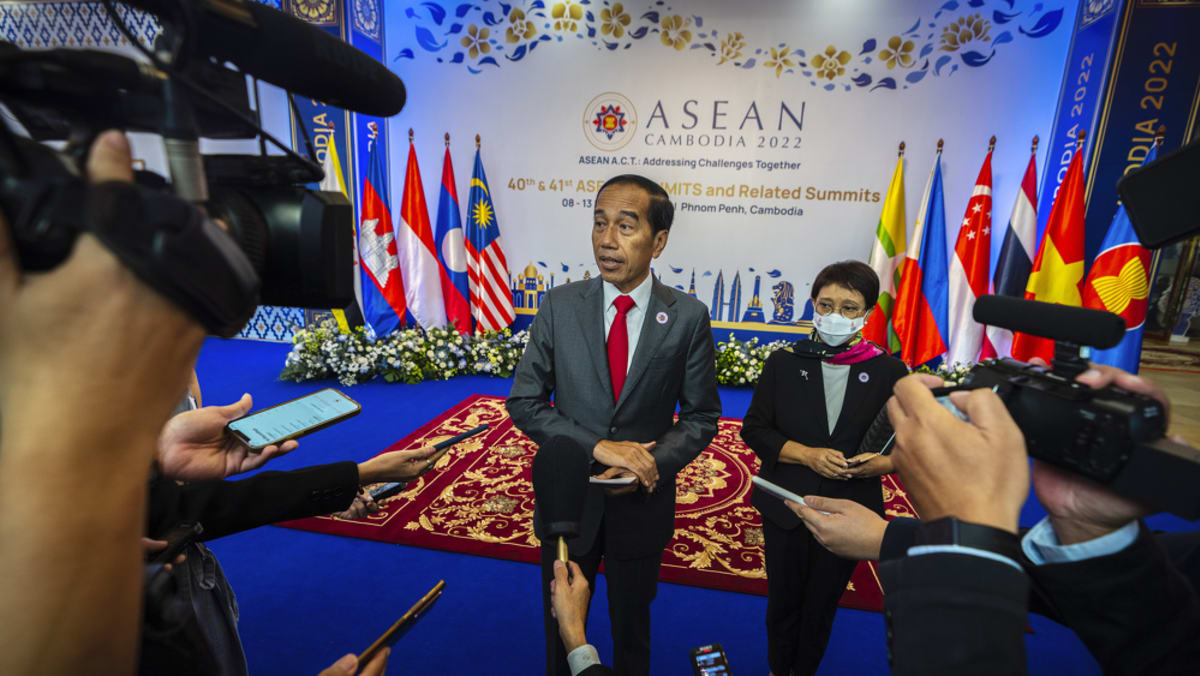
ASEAN had agreed upon the Five-Point Consensus in April 2021 to end the conflict, which Senior General Min Aung Hlaing accepted then.
"Eighteen months on, there has been little progress in the implementation of the Five-Point Consensus," said Mr Lee.
"Violence has not ceased, few political detainees have been released, and there is no dialogue among stakeholders.
"In fact violence has increased, four opposition activists have been executed, and we still have no access to Daw Aung San Suu Kyi."
Nobel laureate and deposed leader Aung San Suu Kyi is serving a total of 26 years in jail after being convicted on a raft of electoral fraud and corruption charges in separate trials.
Myanmar's political leaders have been barred from high-level ASEAN meetings since October 2021.
"Given the worsening situation, for us to weaken this position would be the wrong thing to do. Even to maintain this position fails to reflect the gravity of the situation," Mr Lee said.
"Should there continue to be no progress, then Myanmar should be invited only at the non-political level for ASEAN Summits and all Ministerial-level meetings."
Mr Lee added that the ground situation in Myanmar, especially on humanitarian needs, continues to deteriorate.
"Despite the best efforts of two ASEAN Chairs and their Special Envoys, and direct entreaties by Prime Minister Hun Sen recently, the Tatmadaw has disregarded ASEAN," he said, referring to the Myanmar military.
"This is deeply concerning and disappointing."
Mr Lee said that ASEAN needs to uphold ASEAN’s unity and credibility in line with its charter.
With no political representation from Myanmar, decisions will have to be taken by the remaining nine member states, he said.
These are Cambodia, Singapore, Malaysia, Indonesia, Thailand, the Philippines, Brunei, Vietnam and Laos. Timor-Leste was admitted as an 11th member "in principle" on Nov 11, but is not yet a full member.
ASEAN leaders, however, reaffirmed in Friday's statement that Myanmar remains an "integral part of ASEAN", saying that the growing violence in Myanmar is a major concern which affects not only Myanmar but also ASEAN’s community-building efforts.
Leaders urged all parties in Myanmar to "de-escalate tensions", and said that all parties concerned that bear arms should be "fairly held accountable and condemned for violence", while noting that the Myanmar Armed Forces is the single largest military force in Myanmar.
ASEAN is to call the United Nations and its external partners to support its efforts in the implementation of the Five-Point Consensus, the leaders added.
"ASEAN shall consider exploring other approaches that could support the implementation of the Five-Point Consensus," said the statement.
"We shall review the above decision at our future sessions and mandate the Foreign Ministers to monitor progress and report to the ASEAN Summit.
ASEAN NATIONS DO NOT WANT TO CHOOSE SIDES: PM LEE
Speaking on other global issues, Mr Lee also said that ASEAN countries do not want to choose sides amid an upsurge in geopolitical tensions and major power rivalry.
“We want to engage all sides, and form overlapping circles of partnerships. We should make sure that external parties engage us on our own merits and on these terms,” he said.
Mr Lee said that ASEAN nations must redouble their efforts to forge a “stable and constructive regional architecture”.
“ASEAN’s relevance and credibility hinge on the political will of member states to maintain our sense of unity and uphold ASEAN Centrality,” he said.
“Member states should work together, and avoid allowing our region to be split. ASEAN must remain open and inclusive in engaging external partners.”
Following the ASEAN summits on Friday morning, Southeast Asian leaders will be meeting their counterparts from non-member states, including United States President Joe Biden and Chinese Premier Li Keqiang.
On Russia’s invasion of Ukraine, Mr Lee reiterated Singapore’s stance that it is a clear violation of international law.
“It disregards the principles of sovereignty, territorial integrity and political independence that are vital to all states. It has already caused the tragic loss of many lives,” he said.
“We should continue to urge the combatants and the major powers to find a quick and peaceful solution.”
ASEAN signed with Ukraine on Nov 10 an Instrument of Accession to the Treaty of Amity and Cooperation (TAC) in Southeast Asia, a pact for “peaceful coexistence and friendly cooperation” among the parties. This paves the way for Ukraine to become an external partner of ASEAN.
Mr Lee said that the longer-term and even larger issue is the escalating tensions between the US and China.
The deep strategic mistrust between them can lead to an “escalatory spiral”, with every chance of extensive technological bifurcation and splitting of supply chains, he said.
“On present trends, there is strong likelihood of the US and China each reading the worst into the actions and intentions of the other, with grave consequences for both parties, as well as for our region and the world."
https://news.google.com/__i/rss/rd/articles/CBMiVmh0dHBzOi8vd3d3LmNoYW5uZWxuZXdzYXNpYS5jb20vYXNpYS9hc2Vhbi1zdW1taXQtbXlhbm1hci1maXZlLXBvaW50LWNvbnNlbnN1cy0zMDYzOTEx0gEA?oc=5
2022-11-11 09:38:07Z
1647122610
Tidak ada komentar:
Posting Komentar